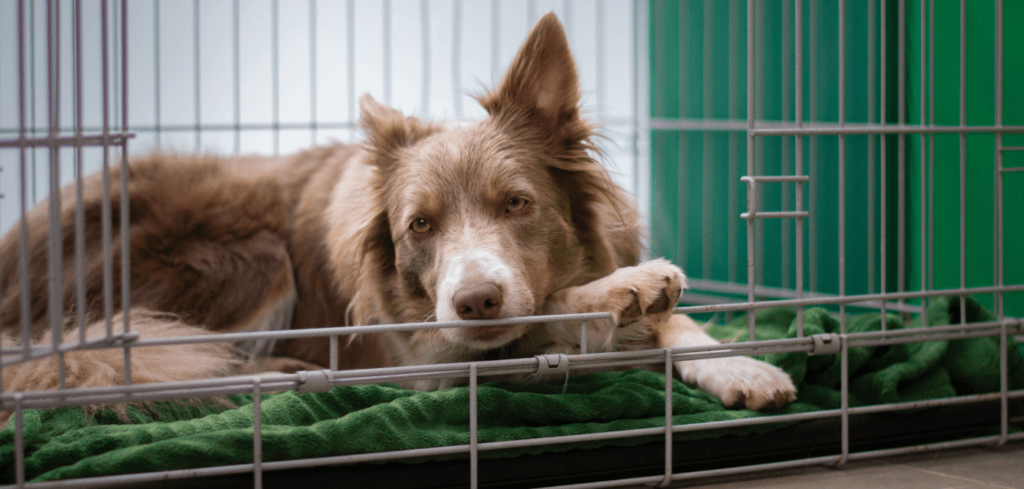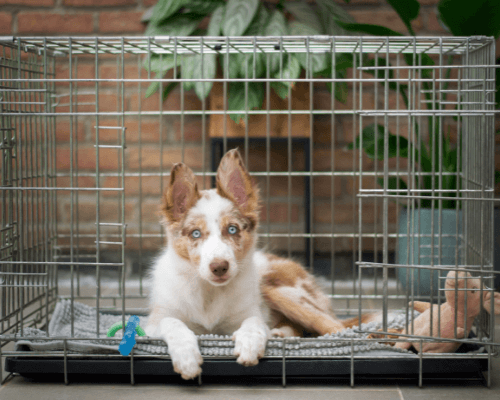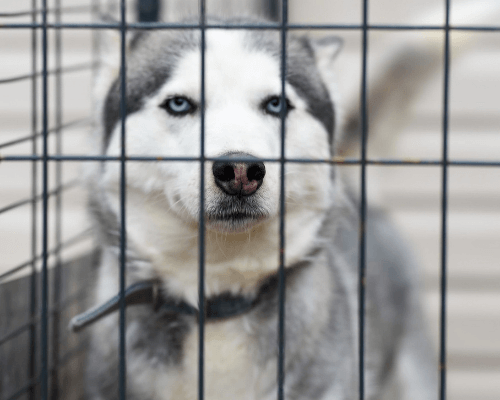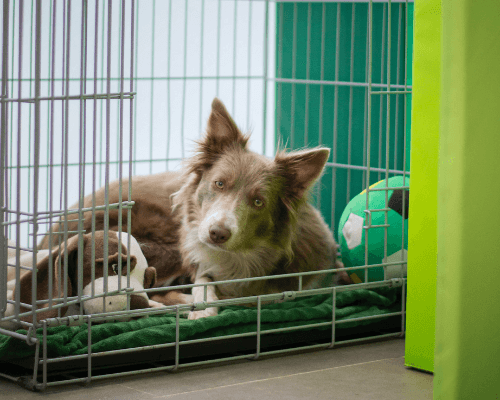
Sudden, unexplained barking is one of the biggest pet peeves of dog owners…
It can be annoying at best and concerning at worst…
This article discusses why your dog is barking in his crate at night all of a sudden, and how to stop it in the future…
Dog Barking In His Crate At Night All Of A Sudden- 5 Possible Reasons Why…
There are many reasons why your dog might start barking in his crate at night all of a sudden. It’s possible that your dog perceives intruders, is bored, has an illness or injury, has to go to the bathroom, or has separation anxiety…
And before addressing your dog’s nighttime barking, it’s important to understand why he (or she) is doing it in the first place.
This is especially true if your dog doesn’t usually bark at night at all. So let’s examine eat of these potential reasons for nighttime barking in a little more detail…
1. Your Dog Perceives Intruders…
If your dog suddenly starts barking non-stop all night, he might be trying to warn you of intruders.
Thanks to their sharp sense of smell and hearing, dogs can sense intruders minutes before they even enter the house.

Dogs identify people through scent, so if your dog smells something unfamiliar or suspicious, he’ll do his best to alert you.
Barking is one of the best ways a dog communicates with his owner, especially if he’s in his crate while this is all occurring.
Here are some signs to look out for that may indicate your dog is sensing an intruder:
- Growling
- Whining
- Raised ears
- Jumping in crate
- Restlessness
- Raising hackles

2. Your Dog Is Bored…
Sometimes, the reason your dog keeps barking at night is simply due to boredom.
Dogs crave human attention; they revel in it. So maybe your dog is barking at night because you didn’t give him much attention throughout the day.
He might be thinking, “now’s my chance to play with my mommy or daddy!” and he’ll bark in an attempt to get you to release him from his crate.
Some dogs do it just to test their limits, and if left unchecked, your dog’s boredom can turn into a behavioral issue in the future.
You can prevent this by making sure your pup is worn out before putting him in his crate at night.
Consider taking him out for late-night walks or to play fetch in the backyard. Give him plenty of exercise and affection.
This way, he’ll be less likely to bark for you at night because he’s received his daily dose of you.
I also recommend you check out this if you feel your dog is bored at home while you’re away at work during the day.
3. Your Dog Has An Illness or Injury…
The sudden onset of nighttime barking might be an indication that your dog isn’t feeling well. This might be because of sickness, injury, or a combination of both.
If your dog sounds distressed and his barking continues for several hours, you’ll want to check on him to make sure he’s alright.

According to experts, the most common medical cause of nighttime barking is Canine Cognitive Dysfunction Syndrome (CDS).
CDS, also known as dog dementia, is a neurodegenerative disorder that affects senior dogs. So if you have an old dog barking at night all of a sudden that may be the reason why.
If you believe your dog might be sick or injured, keep an eye out for these common symptoms:
- Excessive drooling and/or panting
- Labored breathing
- Lack of appetite
- Poor coordination
- Coughing
- Sneezing
- Pacing in crate
- Vomiting
- Diarrhea
If you suspect that your dog is barking at night because he or she is injured or sick, you should contact a veterinarian immediately for guidance…
Worried About Your Dog’s Health? Click Here To Get Answers From A Verified Vet In Minutes (24/7)!
4. Your Dog Needs To Go Potty…
Your dog might be barking at night because he needs to go to the bathroom.
If this is the case, you definitely don’t want to ignore him all night because it’s likely he’ll leave you a ‘surprise’ that you’ll be cleaning up the following day.
Prevention for this is simple. At night, before locking your dog in his crate, take him outside to do what he needs to do.
If you do decide it’s necessary to take your dog out of the crate at night to do his business, don’t open the crate door until his barking or whining dies down.
This will make him think that he can get out of his crate simply by barking or whining, and it will reinforce the behavior.
5. Your Dog Has Separation Anxiety…
Separation anxiety can occur in both puppies and adult dogs.
This disorder happens when a dog becomes hyper-attached to his (or her) owner, so much so that he doesn’t know what to do with himself when you’re gone.
It is possible for a dog to experience separation anxiety when he is away from you in his crate, even if you’re still in the same house.
Alongside excessive barking and howling, some of the biggest signs of separation anxiety are as follows:
- Pacing, trembling, and/or whining just as you’re preparing to leave
- Destructive acts like digging and chewing
- Urinating and/or defecating in his crate or around the house
- Attempts of escape
- Coprophagia (eating stool)
If you think your dog may be suffering from separation anxiety, you should discuss the issue with a veterinarian…
Worried About Your Dog’s Health? Click Here To Get Answers From A Verified Vet In Minutes (24/7)!
How Do I Get My Dog To Stop Barking In His Crate At Night?
Once you understand the reason why your dog is barking at night, here are some helpful tips to consider that might help resolve the issue…
Move the Crate to Your Bedroom…
If you have enough space in your room, consider taking your dog’s crate into your bedroom. This can be helpful for dogs with separation anxiety and dogs who’ve just started crate training.

Keep in mind that if you try this, you should still prevent your dog from getting used to sleeping around you all the time.
Just a couple of days might be a good start, and over time, you can move his crate out of your room (but still close by)…
…and then further and further away from your room until he’s ready to go back to his normal spot.
You might be met with some resistance when moving the crate out of your room, but your dog’s barking will eventually die down once he realizes you’re right next door.

Ignore, Ignore, Ignore…
Checking your dog’s crate every time he barks will merely encourage the behavior.
As previously mentioned, some dogs bark in their cage because they want your attention. Regardless of how cute your dog is, you need your beauty sleep—and he does, too.
So, as long as you don’t suspect that your dog is sick or injured, just ignore his barking until he realizes it won’t result in anything.
You might also consider some proper obedience training, and if you need help in that area, I highly recommend the Brain Training For Dogs program…
I like it because it’s easy to follow, it works quickly, and you can access the program from the comfort of your own home…
Part of the reason it works so quickly and effectively is because it teaches you how to redirect your dog’s natural intelligence into following your instructions…
If you’d like to learn more about how Brain Training For Dogs can help you train your dog to stop barking in his crate, just click the link below…
>> Click Here To Learn How Brain Training For Dogs Can Help You!
Take Your Dog to the Vet…
If all else fails, it might be best to take your dog to the vet to check for medical illness.
Constant barking may indicate discomfort or pain, so if you’re sure your dog isn’t barking out of attention or loneliness, a vet visit might help.

In addition to that, the vet can examine your dog for skin injuries, broken bones, swelling, or any other physical injuries.
If you’d like to contact a vet to discuss your dog’s behavior before taking the time to bring him in, just click the link below…
Worried About Your Dog’s Health? Click Here To Get Answers From A Verified Vet In Minutes (24/7)!
Conclusion…
Dogs bark at night in their crates for a number of reasons, including boredom, illness, separation anxiety, or simply wanting to go to the bathroom.
If the behavior persists for longer than a few days, it’s worth consulting a veterinarian to make sure your dog isn’t suffering from any disease or injury.
Otherwise, the best way to discourage your dog from barking is to simply ignore him and possibly seek out proper obedience training.


